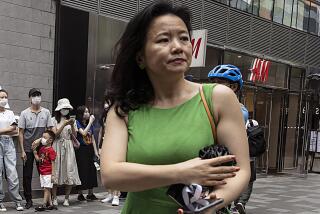China Writer Again Faces Purge in Crackdown on Intellectual Freedom
- Share via
PEKING — There are two kinds of loyalties in this world. One is exposed to risks, while the other is safe. --Liu Binyan, 1985
Liu Binyan is one of the most famous writers in China. His works blend together the style of the novelist with the subject matter of a muckraking reporter.
Over the past eight years, since returning from the countryside where he had been sent into exile under Mao Tse-tung, Liu has been chronicling the underside of Chinese life: the systematic corruption at the grass roots of the Communist Party and the sense of blind obedience that the party has fostered.
Despite such criticism, Liu has served recently as vice chairman of the Chinese Writers’ Assn. and retained his own membership in the Communist Party--until now.
On Friday, Chinese sources said, the party began officially informing its 44 million members that Liu may be expelled from the party. A written document criticizing him was read to party members in meetings at their work units. Party newspapers were reportedly told not to publish his work.
Others Being Purged
Liu is not alone. At least two other prominent Chinese intellectuals are being purged from the party and officially criticized this week as part of the party’s new campaign against “bourgeois liberalism.” Party cadres are being told that the orders for all this came directly from Chinese leader Deng Xiaoping.
The series of actions represent the first step in a sharp crackdown on intellectual freedom being carried out by the Chinese regime. They follow a series of student demonstrations for democracy that the party leadership has blamed on encouragement by some Chinese intellectuals.
The two other intellectuals reportedly being purged were identified as Fang Lizhi, a leading astrophysicist and vice president of the Chinese University of Science and Technology, and Wang Ruowang, a well-known Shanghai writer and editor.
Some Chinese sources said that Liu will be expelled from the party, but others said that although the party leadership has formally criticized him and suggested expulsion, it has left the door open for him to keep his membership, perhaps after making some sort of self-criticism. The sources said the other two men will definitely be ousted from the party.
Backed Student Protests
Fang and Wang were said to have run afoul of the party leadership by supporting the recent student protests and the cause of democracy. Liu is reported to have offended the leadership with his 1985 book, “A Second Kind of Loyalty,” which calls for a questioning attitude toward party authorities.
“On the ideological front, there are indeed a small number of Communist Party members who consider themselves exceptions,” the party newspaper Guangming Daily said Friday in a commentary that mentioned no names. “They exaggerate the shortcomings and mistakes in the socialist cause led by our party and turn a blind eye to the efforts and achievements our party has made.”
Expulsion from the party represents the severest form of political discipline in China, one that effectively prevents the intellectuals from holding any sort of leadership position in society. Still, one Chinese source noted, while these errant intellectuals may be expelled from the party, they will not be jailed or exiled under Deng’s regime, as many of them were in Mao’s purges.
“They can continue their work,” this source said. “Maybe Fang Lizhi can work as a professor (instead of university vice president), and Liu Binyan can be an ordinary writer (instead of vice president of the writers’ association).”
Change of Direction
The party’s actions mark a drastic change of direction from the time not long ago when Liu, Fang and other intellectuals seemed to have the support and encouragement of the party hierarchy.
Only two years ago, Liu was named vice president of the writers’ association at a convention at which the party leadership made pledges of new literary freedom.
At a press conference at the time, Liu told reporters that the intellectual climate in China had changed. There was little fear any more, he said, that writers could be punished for expressing unconventional views.
“As far as I know,” he said, “no writers will oppose the government, because all writers agree that the present government is a good one.”
Perry Link, a professor of Chinese literature at UCLA, said Friday that Liu “has got probably the best foreign reputation of any working Chinese writer.” And he noted that, ironically, Liu is, “intellectually speaking, one of the most serious Marxists in China.”
Link recalled that in 1982, when Liu traveled to the United States to take part in the University of Iowa’s international writing program, he stopped in Los Angeles and spent an afternoon at the Salvation Army bookstore, picking out several cartons of used books, at 25 cents each, to be sent back to Peking. Many of them were by American Marxists.
Once a News Reporter
Liu, 61, began his writing career as a newspaper reporter and until now has retained an affiliation with People’s Daily, the party organ. One of his first works, “Our Paper’s Inside Story,” described the bureaucracy inside a provincial newspaper.
During Mao’s “anti-rightist” campaign of 1957, Liu’s writings were denounced as “poisonous weeds,” and he spent the next two decades in internal exile or in prison. When he was finally rehabilitated, after Mao’s death, he wrote a detailed investigative account in 1979 about the network of connections and bribery through which a local party secretary in Manchuria named Wang Shouxin had stolen more than $150,000.
“Wang Shouxin’s corruption has been exposed, but how about the social conditions that allowed Wang to exist? Have there been any changes?” Liu asked in the book, called “Between Man and Devil.”
In the book that is now under attack, “A Second Kind of Loyalty,” Liu challenged the concept of blind obedience to party leaders. He attacked by name Lei Feng, the model dutiful soldier whom millions of Chinese were once told to imitate.
“I don’t think Lei Feng is at all a perfect model,” Liu wrote. “He has serious, even fatal defects. His imperfection lies in the fact that he only follows orders from above.”
Meeting Plans Alleged
A source who took part in a party meeting Friday said senior officials alleged that Liu has been planning to call an unapproved anniversary meeting soon of about 200 people persecuted in Mao’s anti-rightist campaign 30 years ago.
Fang, the vice president of the Chinese University of Science and Technology, in Hefei, was a central figure in the earliest of the recent wave of student demonstrations. When students demonstrated there in early December to protest that a local election was being carried out in an undemocratic way, Fang said the students’ grievances were legitimate.
In an interview last month in the official Chinese magazine Beijing Review, Fang said that “in the university environment, there should be nothing that can only be upheld and that allows no questioning of why it must be upheld.”
Wang, the other person being expelled from the party, is 68 and another veteran party intellectual. Imprisoned by Chiang Kai-shek’s Kuomintang (Nationalist) regime as a youth, he joined the Communist Party in Mao’s wartime headquarters at Yanan.
Compared Political Prisons
Along with Liu, Wang was branded a rightist in the 1950s and imprisoned during the Cultural Revolution. After his release, he finished a book called “Trilogy of Hunger,” in which he said that prison life seemed better under the Nationalists than under the Communists in the Cultural Revolution.
“The Kuomintang jailer was afraid to lose his job if the inmates died from hunger,” he wrote.
Seven years ago, Wang wrote that it was wrong for the Communist Party to blame its problems on a few evil or “counterrevolutionary” leaders such as former Defense Minister Lin Piao.
“In the final analysis, (they) are due to the absence of a minimum democracy in our country over a long period of time,” Wang asserted. “There is no channel of communication between the masses and the leading party and government cadres.”
More to Read
Sign up for Essential California
The most important California stories and recommendations in your inbox every morning.
You may occasionally receive promotional content from the Los Angeles Times.













